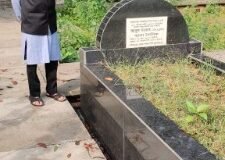Barrister Nazir Ahmed :
The government of Bangladesh is planning to enact a citizenship law which will have serous implication for us, the dual nationals living abroad. The Bill entitled “Citizenship Bill 2015” has already been approved in principle by the Cabinet. It is now waiting to go to Parliament to be passed. Once passed by Parliament, it will go to President for assent. It will then become law. Let us see the implication and impact that the Bill will have on us if it is passed as it is.
The proposed Citizenship Bill 2015 is a poorly drafted document and contains a number of errors. For example, the proper interpretation of the definition of citizenship by birth contained in Section 4(1) of the Bill appears to show that those born in Bangladesh whose parents died before 26th March 1971 are not regarded as having citizenship by birth. Another example is that the definition of “foreign enemy” given at Section 2(7) is not consistent with what is said at Section 5(3). Furthermore, Section 21 states that the offences committed under this Bill are non-bailable offences, but the Bill fails to prescribe the actual or exact punishment if the offender is found guilty. That means dual citizens risk of being persecuted and harassed. Several examples of poor and inconsistent drafting could be given.
Section 5 of the Bill states that a person born abroad to a Bangladeshi parent immediately before the commencement of the Act will be a citizen of Bangladesh. But the person must be registered with the relevant Bangladesh Mission, within two years of his or her birth or the commenc¬ement of the Act, whichever is later. This will have two direct consequences. Firstly, if those who are born prior to the commencement of the Act fail to register within two years of its commencement, then they will not be able to have Bangladeshi citizenship under this provision. Secondly, the children of those parents who became Bangladeshi citizens by virtue of this Section will not be able to claim citizenship under this Section as these parents will have become the Bangladeshi citizen after the commencement of the Act and therefore outside the ambit of this Section. In other words, it would be virtually impossible for the third or fourth generation Bangladeshis to claim Bangladeshi citizenship.
Section 6 purports to state that a birth-citizen of Bangladesh loses his citizenship upon acquiring a foreign citizenship, but then in certain circumstances, they may apply to the government for their Bangladeshi citizenship. By taking away a Bangladesh’s birth-citizenship (the post powerful right one can acquire through his/her birth) and by placing the onus on the individual to go through a bureaucratic process to regain it, the clear message the draft Bill is sending is this: as you have taken up the citizenship of another country, we don’t need you! But if you need us then ask us and we will consider it!
Section 7 of the Bill gives power to the government to restrict further the procedure under Section 6 and remove citizenship gained under the said Section. This provision would not only provide further disincentive to re-acquire one’s birth – citizenship but also is grossly undemocratic as it takes away such drastic power from the legislature and hands it to the executive. That means the government can impose further limitation and restriction through rules, circulars and gazette notification without any approval of Parliament.
Sections 7 and 13 combine indicate that Bangladeshi citizens with dual citizenship will not be able to stand for any elections, be it for Parliament or even in local government, not eligible to be elected as President of the country, will not be allowed any appointment in the public service of the country including judicial appointment in the Supreme Court, and will not be entitled to get involved in any political party or group. These provisions effectively mean that a dual national cannot stand in the Union Council Election as a Member Candidate. He/she cannot apply to become a clerk or a cleaner in a municipality if that job is considered as public service. Not only this, a dual national will be charged with non-bailable offence under Section 21 if he/she is involved with any political organisation.
This clearly is the killer blow! Apart from the voting right and the right to live in Bangladesh, there appears to be, if the Bill goes through, there will be no difference between foreign nationals and Bangladeshis with dual citizenship. If there were any doubts before, this Section makes it abundantly clear that Bangladesh is no longer willing to tolerate the notion of dual citizenship unless the rights of such citizens are severely curtailed and they accept a second class status.
The above provisions are directly contradictory to the Constitution of Bangladesh, the supreme law of the land. Article 27 states “All citizens are equal before law and are entitled to equal protection of law.” Article 28 states “The State shall not discriminate against any citizen on grounds only of religion, race, caste, sex or place of birth.” In relation to the equality of opportunity, Article 19(1) clearly states “The State shall endeavour to ensure equality of opportunity to all citizens.” Article 29 states that there must be equal opportunity regardless of place of birth, for all citizens in respect of employment or office in the service of the Republic. Considering all these constitutional provisions, if the proposed Bill becomes law as it is, the dual citizens will be made a second class or third class citizens of the country.
It is abundantly clear that the Constitution considers all citizens of Bangladesh are equal without exceptions whether they are birth citizens, naturalized citizens or dual citizens, and that the State has no business meddling with that. It therefore goes without saying that only the Constitution has the power to introduce the restriction on equal treatment of any group of its citizens. Indeed, the Constitution has exercised that power under Article 66(2)(C) by declaring that acquiring the citizenship of a foreign state would disqualify a Bangladeshi citizen from standing for Parliament. Why do the government so keen to restrict dual citizens’ right through parliamentary enactment?
While the developed and developing countries of the world appear to be progressive in relation to the notion of nationality and citizenship, Bangladesh seems to be repressive and walking at the opposite direction. French Parliament has twelve MPs who are directly elected by the French nationals living abroad: two are elected from the UK. The similar or identical provision can be found in Finland, Ukraine, Turkey and even in Egypt. Expatriate Bangladeshis, especially the British-Bangladeshis had a unique role and contribution in our independence war, which can rarely be found in the history of other countries. Yet after the independence of Bangladesh, we have been campaigning and fighting for our voting rights for over the last four decades. Let alone getting out voting rights from abroad, we are now about to be deprived of our basic and inherent rights. We need to awake before it is too late. It is not a political issue. It will affect all of us, 1.5 million dual nationals and their uncounted inheritors, regardless of any political affiliation and belongingness.
Bangladesh would be immensely benefited if dual nationals were given a chance to make contribution in nation building. Dual nationals of Bangladeshi origin [who are well settled and established in overseas] would probably gain little from but have a lot to give for a developing country like Bangladesh. We have thousands of dual national graduates (graduated from world class universities, such as Oxford University, Cambridge University, Harvard University, London University, Heidelberg University etc.) and diverse professionals. They can utilize their invaluable talents in taking their homeland forward if they are given chance. They may have taken foreign citizenship’s by way of naturalisation as an advantage and privilege for practical reasons but they have not given up their original nationality acquired through birth (which is the strongest right). They are not required to give up their nationality of origin. Thus, they should not be ignored or deprived of. Otherwise, Bangladesh would ultimately be the loser. The Honourable influential Minister of the current government Mr Syed Ashraful Islam himself was an expatriate – lived and worked a long period in London. No one would better understand than him of British-Bangladeshis’ potentials.
Barrister Nazir Ahmed FRSA: Legal expert, analyst, writer and columnist. He is the Principal of Lincoln’s Chambers Solicitors. He can be contacted via e-mail: ahmedlaw2002@yaho.co.uk
 Weekly Bangla Mirror | Bangla Mirror, Bangladeshi news in UK, bangla mirror news
Weekly Bangla Mirror | Bangla Mirror, Bangladeshi news in UK, bangla mirror news






